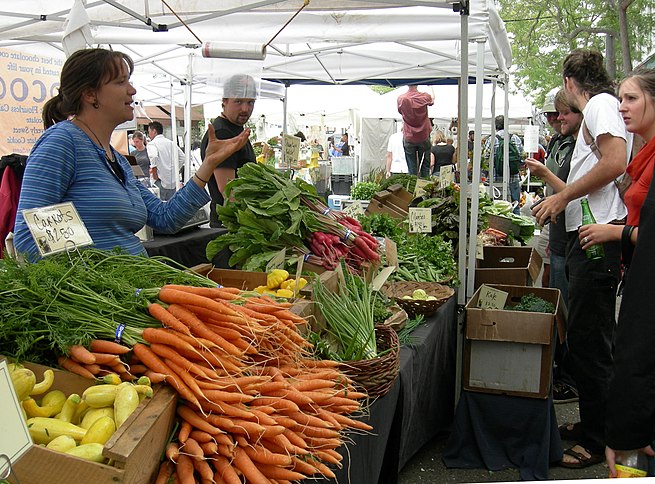
Main Difference
The main difference between Economy and Economics is that the Economy is a system of agents and processes of the production, distribution or trade, and consumption of limited goods and services by agents and Economics is a social science that analyzes the production, distribution, and consumption of goods and services
-
Economy
An economy (from Greek οίκος – “household” and νέμoμαι – “manage”) is an area of the production, distribution and trade, as well as consumption of goods and services by different agents. Understood in its broadest sense, ‘The economy is defined as a social domain that emphasize the practices, discourses, and material expressions associated with the production, use, and management of resources’. Economic agents can be individuals, businesses, organizations, or governments. Economic transactions occur when two groups or parties agree to the value or price of the transacted good or service, commonly expressed in a certain currency. However, monetary transactions only account for a small part of the economic domain. Economic activity is spurred by production which uses natural resources, labor and capital. It has changed over time due to technology (automation, accelerator of process, reduction of cost functions), innovation (new products, services, processes, expanding markets, diversification of markets, niche markets, increases revenue functions) such as, that which produces intellectual property and changes in industrial relations (most notably child labor being replaced in some parts of the world with universal access to education). A given economy is the result of a set of processes that involves its culture, values, education, technological evolution, history, social organization, political structure and legal systems, as well as its geography, natural resource endowment, and ecology, as main factors. These factors give context, content, and set the conditions and parameters in which an economy functions. In other words, the economic domain is a social domain of human practices and transactions. It does not stand alone.
A market-based economy is one where goods and services are produced and exchanged according to demand and supply between participants (economic agents) by barter or a medium of exchange with a credit or debit value accepted within the network, such as a unit of currency. A command-based economy is one where political agents directly control what is produced and how it is sold and distributed. A green economy is low-carbon, resource efficient and socially inclusive. In a green economy, growth in income and employment is driven by public and private investments that reduce carbon emissions and pollution, enhance energy and resource efficiency, and prevent the loss of biodiversity and ecosystem services. A gig economy is one in which short-term jobs are assigned or chosen via online platforms and a programmable economy is the set of revolutionary changes taking place in the global economy due to technology innovations. New economy is a term referred to the whole emerging ecosystem where new standards and practices were introduced, usually as a result of technological innovations.
-
Economics
Economics () is the social science that studies the production, distribution, and consumption of goods and services.Economics focuses on the behaviour and interactions of economic agents and how economies work. Microeconomics analyzes basic elements in the economy, including individual agents and markets, their interactions, and the outcomes of interactions. Individual agents may include, for example, households, firms, buyers, and sellers. Macroeconomics analyzes the economy as a system where production, consumption, saving, and investment interact, and factors affecting it: employment of the resources of labour, capital, and land, currency inflation, economic growth, and public policies that have impact on these elements.
Other broad distinctions within economics include those between positive economics, describing “what is”, and normative economics, advocating “what ought to be”; between economic theory and applied economics; between rational and behavioural economics; and between mainstream economics and heterodox economics.Economic analysis can be applied throughout society, in real estate, business, finance, health care, and government. Economic analysis is sometimes also applied to such diverse subjects as crime, education, the family, law, politics, religion, social institutions, war, science, and the environment.
-
Economy (noun)
Effective management of a community or system, or especially its resources.
-
Economy (noun)
The regular operation of nature in the generation, nutrition and preservation of animals or plants.
“animal economy, vegetable economy”
-
Economy (noun)
System of management; general regulation and disposition of the affairs of a state or nation, or of any department of government.
-
Economy (noun)
A system of rules, regulations, rites and ceremonies.
“the Jewish economy”
-
Economy (noun)
The study of money, currency and trade, and the efficient use of resources.
-
Economy (noun)
Frugal use of resources.
-
Economy (noun)
The system of production and distribution and consumption. The overall measure of a currency system; as the national economy.
-
Economy (noun)
The method of divine government of the world. (See w:Economy (religion).)
-
Economy (noun)
The part of a commercial passenger airplane or train reserved for those paying the lower standard fares; economy class.
-
Economy (noun)
Management of one’s residency.
-
Economy (adjective)
Cheap to run; using minimal resources; representing good value for money.
“He bought an economy car.”
“Economy size.”
-
Economics (noun)
The study of resource allocation, distribution and consumption; of capital and investment; and of management of the factors of production.
